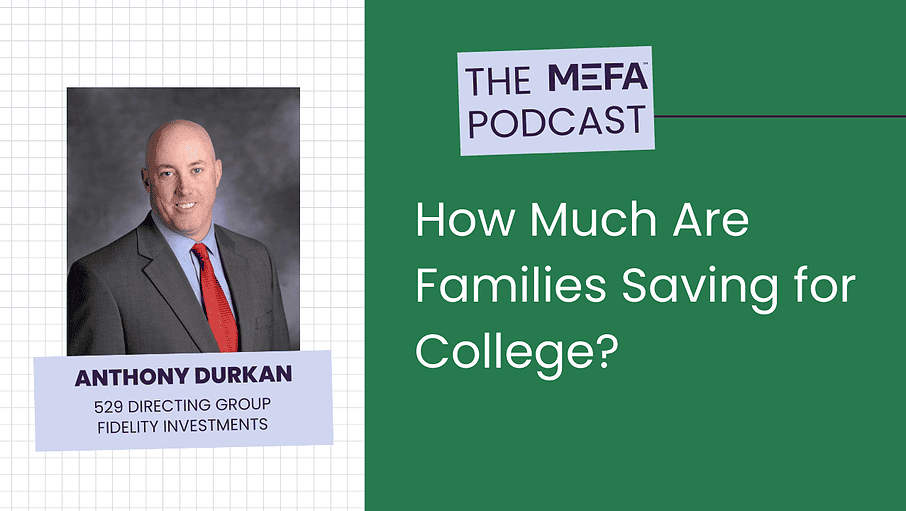Resources Mentioned in this Episode
Please note that this transcript was auto-generated. We apologize for any minor errors in spelling or grammar.
Jonathan Hughes: [00:00:00] Hi everyone, and welcome to the MEFA Podcast. My name is Jonathan Hughes.
Julie Shields-Rutyna: And I’m Julie Shields Rutina.
Jonathan Hughes: Ah, it’s good to be back with you, Julie.
Julie Shields-Rutyna: I know, good to be back.
Jonathan Hughes: Alright, we are deep into September, which is College Savings Month, and so today we have a show that is packed full of good stuff for parents and anyone else who may be saving or thinking of saving for a student.
A little bit later on, you’re going to hear my interview with Anthony Durkin. He is the vice president and head of 529 Relationships with Fidelity Investments. Fidelity, of course, is a very valued partner of ours as they manage both the U Fund, Massachusetts 529 Plan, and the Attainable plan, which is the Massachusetts Ables plan or 529A plan.
Uh, so Fidelity, in addition to [00:01:00] being deeply involved in this world of 529s, uh, they do a survey every year about how America saves for college. And so we are going to be going over their findings from that survey. So you want to stick around for that. But before we get to that, we actually have some big college savings news to break ourselves, don’t we?
Julie Shields-Rutyna: We do. And this is exciting. I’m excited about this. So, after many months of preparation, MEFA is pleased to announce that UFund gift of college cards are now available at CVS locations across Massachusetts.
Jonathan Hughes: Yay, let’s stop for a minute and applause for that because I know this is a long time in the coming.
So what is this and why is this such a big deal?
Julie Shields-Rutyna: Sure. So it’s just, these are essentially gift cards. So I think everyone, you know what this is. When you go into CVS and you see that there are racks [00:02:00] of gift cards that you can purchase for things like restaurants, video games, stores, um, and you will now notice that ours, um, which are the gift of college, cards will be in locations across Massachusetts, right amongst all of those other cards.
And so you can purchase a MEFA U Fund branded gift card in amounts ranging anywhere from 25 to 200. And then you can give that as a gift to a prospective parent, a parent or a child for a birthday, a graduation or any other occasion that you’d like. And then the money can be redeemed.
Jonathan Hughes: And then it’s put into a U Fund for the student.
Is that the idea?
Julie Shields-Rutyna: It is. So the idea is, you know, someone would take that and then the, uh, the recipient would put that into a U fund. But people have other options, too. So, of course, the U fund is our Massachusetts 5 29 plan. [00:03:00] Um, but it can also be invested in Another college savings account, any of them really across the country, like any other 529 plan, which includes the U fund.
Um, but also, you know, MEFA has our U plan, uh, which is our other savings program. And it can be, it can be. put into that prepaid tuition plan. Um, it can also be used for an ABLE plan. So if someone has an ABLE account, you can put it in there. Or, this makes it so flexible, it can also be used as a payment against a student loan.
People could always give a gift, um, Of putting some money into a you fund for someone like for a baby shower, but, um, the way it worked is they would there’s a gifting page on the fidelity site and the owners could set that up and then other people could get an email link [00:04:00] and then put money in that way.
That was great. It worked. But, you know, this is just so much easier. And, you know, Most people walk into a CVS sometimes and I, I know if I’m going to a baby shower, I’m always walking into a CVS probably to pick up a card and then you can pick up a gift card right there. It just seems so easy and like something most people would find easy to do to be able to show up with a gift in hand.
And, uh, so that’s why, you know, people have been asking for this and I just think this is such a nice option.
Jonathan Hughes: For sure, for sure. I know they’ve been asking about it. And speaking of somebody, I tell the story all the time when I opened up my first UFund account for my nephew, um, my sister’s son. And it was kind of hard because I had to get social security numbers from her.
I had to do all these things. Um, you know, it really makes it much easier to give as a gift this way. Uh, and so I was thinking [00:05:00] about this. pretty much through that 529 U Fund lens, uh, but I was really excited. About the other uses, I didn’t know that that was going to be, uh, a possibility talking about the U fund, uh, the U plan that is and and the able plan and the student loan plans.
So if you could tell me a little more about that.
Julie Shields-Rutyna: Yeah. And so, you know, this. Seems like an easy gift to give to parents of children who want to save for college. Also, you know, as I mentioned, expecting parents might be just giving that little nudge to a parent who maybe hadn’t thought about that because they’re thinking about so many other things when they’re about to have a baby.
Um, but then the fact that you could give it to a college graduate who could use it to pay off some of their student loans and to give it to someone. Who, um, is a person with a disability who has an ABLE account, um, that you could put it right in there. And, [00:06:00] um, so that’s, I think, again, the flexibility and the many uses make this so great.
Jonathan Hughes: Yeah, and just in case anybody missed our August shows about ABLE plans, can you just briefly describe what that is?
Julie Shields-Rutyna: Absolutely. So, ABLE plans are like 529 plans in that they function in a similar way. So, money is invested in a market, grows tax deferred, and can be then used tax free. For qualified expenses.
Now with 529 plans, we know qualified expenses are qualified educational expenses, but with able, um, actually the qualified expenses are a little bit broader. So able plans are for individuals with disabilities and could be used for things like, you know, health expenses, education, assistive technology, basic living expenses, transportation.
So anyone who has an ABLE account, um, can use it in many ways and not pay [00:07:00] taxes on the earnings. And so to have someone be able to gift into that is, is really nice as well.
Jonathan Hughes: Yeah. So before we move on to the next part of the show, since I have you here, um, you are the parent of two. Pretty recent college graduates, right?
And if somebody needed a little nudge in the direction of giving this as a gift or starting to save, save in a 529 plan. What would you tell them?
Julie Shields-Rutyna: Yeah, I would just say that having saved and when I say saved, I wasn’t as if I saved every penny for either child, but having saved in both the U Fund and the U Plan, um, because of course I work at MeFun, I wanted to try both, um, was made a huge difference when it came time to pay those college bills.
Just when my children were deciding on what college they were going to go to and I was. You know, looking at that first bill, [00:08:00] just knowing that I had a good amount of savings at that point, lessened You know, my stress about paying for college so much. I mean, we applied for financial aid, both kids received a little bit of financial aid, and um, you know, we used, we used a lot of strategies, but having the savings really took the pressure off all of the other ways that, um, that we were going to pay.
And I guess what I’d also say is, um, that I actually didn’t start saving for my kids when they were Just born or babies because there weren’t as many things in place to make it. Is easy to do that or it wasn’t, um, hopefully we’ve really promoted saving for college over these last number of years. Um, and so I think something like this gift card just makes it very easy, uh, for for people to, uh, Open an account early and let other people help them save with, uh, with gifts over the years and things like [00:09:00] that.
Jonathan Hughes: Julie, what do you think about a mailbag question?
Julie Shields-Rutyna: Of course.
Jonathan Hughes: All right, so let’s head to the MEFA mailbag. And these are questions that have come in to us over the past weeks and have been answered by our college planning team. Now remember, if you have any questions, you can email us at collegeplanningatMEFA.
org. You can call us at 800 449 MEFA, and you can also reach us over social media on Facebook, that’s MEFA MA, on X it’s at MEFA tweets, and on Instagram it’s MEFA underscore MA. Now, of course, I had to make this a 529 question, because I wanted to be thematic here. So our question today comes to us from Jessica, who writes, what is the difference between an individual 529 account and a custodial 529 account?
Julie, can you tell folks when they would see that question and what the difference is?
Julie Shields-Rutyna: Yes, so when you go online, uh, to open a U Fund account with Fidelity, [00:10:00] um, there’s a nice, fairly, you know, easy application there. Early in the, uh, questioning, after the demographic information, it will ask you, do you want to open an individual account or a custodial account?
And honestly, most of the time, you’re going to just pick an individual account. That’s pretty much it. That really is mostly when someone is opening a new account, that’s what you’re going to pick. And that the only time you would pick A custodial account is if you had another type of account that was a uniform gift to minors type of account and you withdrew money from that, um, which had to be used for the student who was the beneficiary and couldn’t be changed.
So that’s a stricter criteria than a regular you fund account. So if you had that type of account, you withdrew money and you wanted to Put that into a U fund account. That would be a [00:11:00] custodial U fund account, and it would be just like any other U fund account except for one difference. You could never change the beneficiary.
So that’s the one additional restriction for a custodial account. But again, when you’re going on to open a youth fund account, you’re mostly choosing an individual account.
Jonathan Hughes: All right, Julie, well thank you. One more time. If you have questions, you can email us at college [email protected]. You can call us at eight hundred four four nine mefa.
Our Facebook is MEFA MA X at MEFA tweets. And Instagram at MEFA underscore MA. Just to remind everyone, we have a bench of college guidance experts that are waiting to answer
If you could just start by, uh, giving us your name, where you work and your title and, uh, [00:12:00] how long have you been doing that?
Anthony Durkan: Yeah, Tony Durkin from Fidelity Investments. I, uh, I’m the team leader for the 529 Managing Director Group. I’ve been with Fidelity now, it’s, today’s my anniversary as a matter of fact.
I just, I just learned, uh, this will be my, I’m in my 23rd year at Fidelity.
Jonathan Hughes: Oh, congratulations.
Anthony Durkan: Yeah, thanks. Thanks.
Jonathan Hughes: Can you just explain briefly, in case anyone doesn’t know, how MEFA and Fidelity work together?
Anthony Durkan: Yeah, so the foundation of it is all 529 plans have to be sponsored by state. And in the case of the Massachusetts, uh, MEFA was created to sponsor the program.
And they, uh, we were fortunate they chose Fidelity to become the program manager for their 529 plan, the U Fund.
Jonathan Hughes: It’s been, it’s been a long and happy It
Anthony Durkan: continues to evolve and it continues to grow. It’s, uh, uh, it’s been great for sure.
Jonathan Hughes: Yeah, certainly. [00:13:00] And, and, you know, to that end, you’re here to talk to us about something else that you do, which is Fidelity’s College Savings Indicator Report, right?
And that is released, uh, was released earlier in the summer. Can you tell everybody what that is? Did I get the name right?
Anthony Durkan: Yeah, the College Savings Indicator, or we shorten it up to say CSI Survey. Uh, so what we do, Jonathan, every two years, uh, we do a nationwide survey and we do a Massachusetts, abbreviated Massachusetts version of that.
Really the purpose of the survey is to just get an understanding of how people are thinking about, you know, college costs, vehicles to use to save for those college costs. Um, you know, what is a 5 29? Um, how does it work? You know, what are the advantages? So, uh, it really gives us a good sense of, of [00:14:00] people’s mindset on how they feel about, uh, saving for college and saving for educational expenses.
Jonathan Hughes: And what does this year’s CSI tell
Anthony Durkan: us? One of the big revelations was, um, more people are saving now, uh, for college than they have in the past. I don’t have the exact numbers in front of me, but when we started the survey back in 2007, I think that number was around just north of 50 percent, might have been around 53.
Uh, and what we found now is it’s over 72 percent of our savings for college. So, you know, great, uh, great revelation there um What we’re also noticing and this is actually the past two studies the The indicators are showing that people are prioritizing college savings ahead of retirement savings, which Hello, a lot of people ask, you know, how how can that be and you know, given the The environment that we’re in, [00:15:00] you know, we’re hearing a lot about student debt, student debt crisis, student loans, um, and, you know, generally speaking, the rising cost of inflation.
That’s really driving the conversation for parents to say, you know, we really need to, to think about college savings and education savings even more.
Jonathan Hughes: Yeah. And so that was actually an answer to a question I was going to ask you about the increase in saving for college since it’s gone up from just over 50 percent to 72 percent in the intervening year since you started the study.
Do you think that is a response to, you know, Those outside factors, or does sort of awareness start to grow that as well?
Anthony Durkan: Yeah, I think, you know, there’s certainly, um, the different topics of conversation are, are gearing or slanting towards, you know, college and, um, you know, and, and, and in a good way. I, you know, even with the rising cost of [00:16:00] college, what we did find Parents still believe there’s a value in saving for college and going to college and there’s still, um, value in getting that education and getting that diploma, um, and leading to successful outcomes, you know, in the, in the job market.
Yeah, a lot of factors, uh, that you mentioned. Sure.
Jonathan Hughes: That is something that really jumped out at me because this has become a big topic. People’s attitudes about college and whether or not college is worth it. So it was really interesting to see that a lot of parents still do think it’s worth it and worth saving for.
Anthony Durkan: Yeah, you know, the other part of it is We talked about inflation in one in four parents do think inflation is a primary barrier, um, to saving for college and saving for anything really, um, you know, managing long term savings with day to day expenses, uh, you know, It can be a daunting task. I think we, we all experience that.
Right.
Jonathan Hughes: Is that something that you’ve [00:17:00] seen? I imagine it is. But is that something that you’ve seen Spike in this recent CSI, uh,
Anthony Durkan: spike?
Jonathan Hughes: Would,
Anthony Durkan: can you elaborate on that?
Jonathan Hughes: Uh, uh, that is, uh, yeah, that the, um. The role of inflation.
Anthony Durkan: Yeah.
Jonathan Hughes: And, uh, you know, that being a primary impediment to saving for college.
Anthony Durkan: Yeah.
You know, it serves, it’s almost a double edged sword. It serves, you know, two purposes. Like it does, does create some challenges to parents saving and saving in general. Um, at the same time, you know, because they still value and believe in the value of a college education. They do want to save, um, and they’re, they are finding ways to do that.
Um, you know, whether that’s, you know, they’re saving obviously their own money. There’s some dynamics now with gifting, which is getting a lot of traction where, you know, parents can reach out to family, friends, grandparents. You know, on that birthday, [00:18:00] rather than getting a toy, uh, they’d much rather see, uh, you know, gift or towards the, uh, the 5 29 plan.
And, and that, um, is really gaining a lot of traction. The gifting, um, gifting. We’re seeing it. We’re seeing a big uptake there.
Jonathan Hughes: Can you talk about what parents know about the cost of college and how this may impact their savings?
Anthony Durkan: Yeah. So it’s, it’s interesting. So, um, what we have found, and this is again, for the past two surveys, what we’re finding is parents are guessing.
Um, they don’t really know. And the goalposts Um, and a lot of that is driven by the, uh, by inflation, so they’re, they’re taking their best guess, um, which we, you know, certainly would, would like to, um, help and mitigate that and, and, and get them on a better road. Uh, but yeah, it’s with the rising cost of call in college when we talk about inflation, you can think of it in two ways.
There’s general inflation that we hear about in the [00:19:00] news. What we don’t hear a lot about is. College, the cost of higher education in that inflation number, you know, what we know is that that number has been running higher than general inflation. So it certainly creates a challenge for a parent to, you know, figure out what that, what that figure is.
Jonathan Hughes: Do we have any idea how they’re guessing or what are, do you think that they are guessing based on, you know, Uh, press figures of how much it costs to go to college or the most expensive local college, or I know this may not have been something that was asked about within the CSI, but, but, um, any idea on that whatsoever?
Anthony Durkan: Yeah. So, you know, we do, we do have some, I don’t have the figures in front of me, but, but anecdotally, what I would say is parents are basing it on their experience. Right. So, you know, I think about what the cost of college was when I was going, that number is [00:20:00] a lot higher now than it was. Um, so we do find parents, they’re just using their own basic experience and what they paid, um, you know, without, you know, going into, um, and, you know, maybe we can talk about, you know, the things that can help them get there, uh, but rather than looking at, you know, research reports or news reports.
They’re simply guessing based on their own experience.
Jonathan Hughes: And, uh, you know, using their own guesses, how are they doing in their efforts to save?
Anthony Durkan: Yeah. So, what we do see is parents do want to save, and they do want to help and pay for their child’s education. Um, you know, in a perfect world, they’d be able to pay 100%.
Um, but parents are targeting, you know, maybe I’ll, I’ll, I’ll definitely pay for a portion of that. And then maybe student loans, you know, take over the, over the rest or, or some grants and scholarships. Um, [00:21:00] but you know, what, what we would, what we would advise and what we tell, you know, our participants and, you know, our parents is, you know, first you have to have a plan.
Right. Um, most parents are expecting to pay for at least some of the child’s education. Um, but many are not on track to meet the goal and that’s primarily because they don’t have a plan and you know, fidelity and fidelity. We can certainly We can certainly help with that. Uh, you know, we do have investor centers that folks can walk into and make an appointment to sit down with a financial consultant, um, and develop that plan.
Jonathan Hughes: What role does communication between parent and student or parent and child play in
Anthony Durkan: this?
Jonathan Hughes: It,
Anthony Durkan: it, it helps tremendously. Uh, we did find that parents that talk to their children, uh, about the costs and about the expectations. you know, tend to have more saved, uh, in the long run than those that then versus those that don’t.
So, you [00:22:00] know, the other thing we talk about is You know, you have the plan, you talk to your children about this, um, the cost of college, and then you, you have to decide what vehicle you’re going to use. And obviously, uh, we would recommend highly the, the flexible tax advantage 529 plan, you know, such as the youth fund.
Um, you know, what the study did show on that aspect is people using a 529 to save for education expenses. also tend to have more saved and closer to their goal, uh, than those, that, uh, than those parents that don’t have.
Jonathan Hughes: I want to go back for a minute to talk about something else that you mentioned earlier, which is gifting.
Um, and you’ve seen that really take off. Can you talk a little bit more about that?
Anthony Durkan: Yeah. So, so one of the great, one of the great, um, advancements that we’ve had, uh, you know, with on Fidelity’s website, um, Uh, we have a gifting tool, um, where you, you can go [00:23:00] in and you basically, you send out an invitation to, you know, your loved ones, um, inviting them to make a gift, uh, into the 529 plan.
So, uh, it’s, it’s very, it’s seamless, it’s efficient, it’s easy, it’s intuitive. Um, and those gifting tools, um, have been great, you know, since the, since we’ve advanced that and made it more efficient. Um, yeah, the, the utilization has been, has been strong.
Jonathan Hughes: Now, let’s say if somebody doesn’t have a plan yet to pay for college and they’re thinking about it, But you know how it is with the parents of, of younger children, you know, that’s not something they need to worry about right now, or maybe they’re, they’re, they’ve got some misgivings.
What are some common concerns that people might have when it comes to beginning to pay for college?
Anthony Durkan: Yeah, yeah, you know, one of the big concerns that we hear barriers to entry is, you know, what if my child doesn’t go to college? Um, you know what, if I save [00:24:00] all this money, um, they don’t go to school. Or what if I save all this money?
They go to school or, you know, they get a scholarship and, you know, um, and there’s money left over. But, but to focus on, on the first one, and the biggest one is what if my child doesn’t go to school, doesn’t go to college? The great thing with 529, the evolution of 529, there’s been great advancements and from a legislative perspective that have made 529s more flexible.
So it’s not just for college education anymore. You can use it for K through 12. You can use it to pay back student loans. You can use it for vocational and technical schools. And, you know, with the most recent legislation, Secure 2. 0. It will, uh, under certain eligibility criteria, it will allow, uh, the transfer of up to 35, 000 into a Roth IRA, and You know, as [00:25:00] you think about that, that would give the beneficiary, the child, a pretty jumpstart towards retirement savings.
Jonathan Hughes: Yeah, I know that that has been, um, something that is really welcome. Because, you’re right, the first question that comes up is, well, what happens if they don’t go to school? I have all this money, I’m going to get penalized if I take it out. There’s this other option that you can do and that’s going to benefit the child quite a lot.
Anthony Durkan: Yeah, yeah, you know, I, I try to stay close to, you know, what’s happening in Washington. Um, and as we think about legislation, you know, from the past, it has been 529 plans. There’s legislation now in Washington under review with House and Ways Committee that would further The utilization of 529 plans for first certificate programs.
You know, my son is going after his CFA is chartered financial analyst designation. Um, if the legislation would pass, you’d be able to use [00:26:00] it to offset that cost. With, with the ability to transfer to the prop that’s on the table for him. Um, and we talked about it and I said, why don’t you hold off?
Because I knew the legislation. Uh, that’s pending. Yeah. Um, I said, why don’t you hold off? There’s no rush. Um, let’s see if this legislation passes and, you know, you, you’d be able to offset some of the costs for that, that CFA, uh, exams.
Jonathan Hughes: And it’s funny, I just spoke with somebody for this podcast, in fact, who was able to fund their undergraduate and graduate programs to completely through aid.
And they’re 529s and has money left over and is planning to transfer that remaining amount over to a Roth IRA. So
Anthony Durkan: huge. Yeah, major advancements. I’ll give you another example. Um, it actually works in the reverse. So, um, one of my colleagues. Um, his wife is going back to get her
Jonathan Hughes: MBA.
Anthony Durkan: They had saved, they [00:27:00] had saved for their children in their 529s, have leftover money.
And he came to me and asked, Hey Tony, can, can I change the beneficiary to my wife? And use that to pay for her MBA. And the answer is yes. So, you know, the, the interesting dynamic of, you know, the, the child now paying for the, for the parent. Right. Paying for the parent’s education. So, uh, interesting dynamic there.
Sure.
Jonathan Hughes: Alright, so now that everybody knows how great 529 plans are, they want to sign up for, uh, a U Fund. How can somebody do that?
Anthony Durkan: Yeah, easily visit fidelity dot com slash 5 29. You’ll see the U fund on that landing page and, um, you will have access also to tools and calculators. Um, you know, we have a toll free number that we have a dedicated college planning associates.
You know, we talked about, you know, some of the questions parents have, [00:28:00] uh, we’ve got the tools and resources that they can help answer all those questions.
Jonathan Hughes: Uh, well, Tony, thank you very much. I love having folks from Fidelity on because we do, um, have such a great relationship with Fidelity and, uh, you are such experts and, and in this and in many other financial matters.
So you carry a lot of, Uh, weight and credibility with you. So it’s great to have you on.
Anthony Durkan: I appreciate, I appreciate the kind words and, and, you know, happy, happy to be on and, and thanks for having me. This is a great discussion. Love to do it again.
Jonathan Hughes: Okay. Thanks, Tony.
Anthony Durkan: Thanks Jonathan. Appreciate it.
Jonathan Hughes: Alright, folks. Well, that’s our show. I want to thank Anthony Durkin for being here and sharing his time and his expertise with us. Julie, thank you so much.
Julie Shields-Rutyna: You’re welcome, John.
Jonathan Hughes: And folks, if you liked what you heard on the show today and you want to hear more from us on planning, saving, and [00:29:00] paying for college and career readiness, Well, then you can follow the show and you can find us wherever you find your podcasts.
And please remember to rate and review us. I’d like to thank our producers, Sean Connelly. I’d like to thank AJ Yee, Lisa Rooney, Lauren Danz, and Meredith Clement for their assistance in getting the show posted. Once again, my name is Jonathan Heves, and this has been The MEPA Podcast. Thanks.










